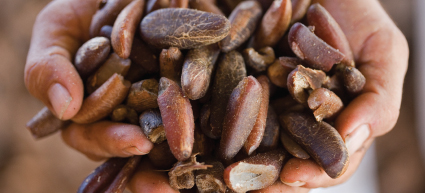WASHINGTON, DC – As new UN figures show that COVID-19 is pushing millions more people into food poverty, ActionAid is warning that smallholder farmers urgently need seeds, credit, and income support to prevent the pandemic escalating into a global hunger crisis.
Niranjali Amerasinghe, Executive Director at ActionAid USA, says:
“Our government must recognize farmers as frontline workers in this crisis and ensure they get appropriate support so they can keep growing affordable, healthy food for their communities.
“Small family farms provide as much as 80% of our food supply in Africa and Asia, yet so far, they have been overlooked in governments’ COVID-19 response. Women farmers in particular are struggling with the triple whammy of lost earnings, increased unpaid care, and soaring gender-based violence during COVID-19.”
ActionAid is calling on government to ensure that farmers can continue to produce and sell their crops during the pandemic, including by procuring food relief and school meal supplies directly from local producers and enhancing access to markets.
The social justice organization, which works in solidarity with thousands of farmers across the world, warns that many farmers may be forced to sell their tools, land, and assets unless government expands social protection schemes, rural health care, and other support such as affordable credit facilities.
The UN’s State of Food Security and Nutrition in the World report, published on July 13, shows that more than 2 billion people did not have regular access to safe, nutritious, and sufficient food in 2019. 144 million children under the age of five were stunted, and 229 million children were malnourished.
“Hunger has already been on the rise for the past five years due to climate change, putting the global goal to end hunger by 2030 shamefully off track,” Amerasinghe says. “COVID-19 recovery plans need to prioritize investment in sustainable, climate-resilient local food systems, so that people can survive even greater challenges as the climate crisis intensifies.”
The UN report estimates that the annual social cost of greenhouse gas emissions associated with current dietary patterns will exceed $1.7 trillion by 2030. Increasing people’s access to healthy diets can help reduce health and climate-change costs by 2030.
The COVID-19 crisis is pushing millions more people into food poverty across the Global South and North:
- In India, between March and June, ActionAid delivered food support packages to 3.9 million people as part of its Covid-19 crisis response, targeting families in the poorest and most marginalized communities, including survivors of gender-based violence, sex workers, ethnic minorities, disabled people, migrants and informal workers.
- In Brazil, ActionAid and partners in the semiarid region, one of the driest areas of the country, delivered food baskets sourced from smallholder farmers to more than 8,000 families. This provided vital food relief for families whose livelihoods have been lost due to the pandemic and generated income for farmers, including many women, who have been impacted by Covid-19 restrictions. ActionAid, along with more than 800 organisations, networks and movements, is also supporting requests for investment in Brazil’s Food Acquisition Programme, which was introduced in 2003 to support smallholder farmers and provide access to national markets serving hospitals, schools and popular restaurants. In recent years, funding for this vital program to improve food security has been dramatically reduced. Activists are asking for one billion reais to support smallholder farmers affected by the closure of markets due to the pandemic. So far R$500m has been awarded.
- Before the pandemic, ActionAid was already responding to a food and climate crisis across Southern Africa caused by the worst drought in the region for 35 years, two cyclones and flooding, leaving 45 million people experiencing food insecurity. In Zimbabwe, before Covid-19 hit, 7.7 million people were food insecure and employment was as high as 80%. The climate crisis has shortened the agricultural season leaving poor, smallholder farmers, the majority of whom are women residing in rural areas, with dramatically reduced yields. Nearly 9 million people are expected to be suffering from hunger by October, while the as price of maize has soared by 66% to $5 per 20kg.
ActionAid is calling for:
- Governments to procure COVID-19 food relief and school meal supplies from local producers to help sustain their livelihoods.
- Replenishment of the Global Agriculture and Food Security Program (GAFSP), an innovative fund to support low-income countries’ agriculture introduced in the wake of the 2008 food crisis, to avoid another global hunger emergency.
- Minimum income support for farmers and farm workers.
- Support for programs that connect smallholder farmers to consumers, through direct local sales, door to door sales, local markets with physical distancing measures, independent shops and food apps that support local producers.
- Debt cancellation and emergency liquidity support for developing countries so that they can expand social protection, health care and other essential services to rural communities and other groups hard-hit by COVID-19.
- Longer-term COVID-19 recovery plans to include significant investment in creating green livelihoods in sustainable, climate-resilient agriculture.
ENDS.
For more information and interviews, contact Christal James at 1-704-665-9743 or christal.james@actionaid.org.

